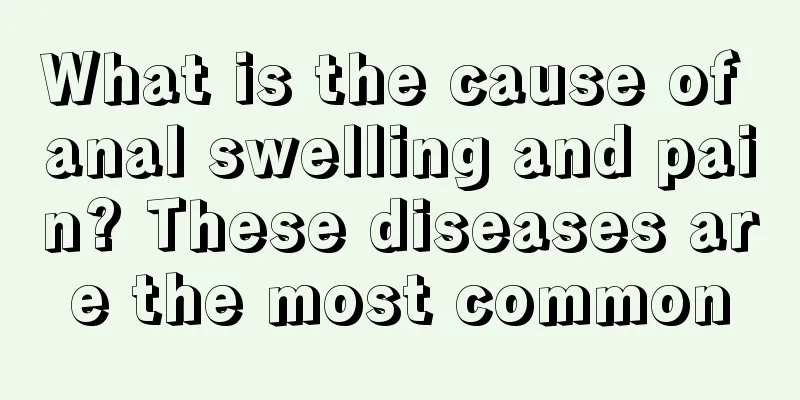What is the cause of anal swelling and pain? These diseases are the most common

|
There are many reasons for anal swelling and pain, the most common ones are anal fissure, hemorrhoids, constipation, and perianal abscess. No matter what disease causes it, it must be treated as soon as possible. In addition, you should develop good eating and bowel habits to avoid this phenomenon. 1. What is the cause of anal swelling and pain? 1. Anal fissure: The main symptoms of anal fissure are severe pain in the anus and blood in the stool. 2. External hemorrhoids: External hemorrhoids are a type of hemorrhoids. After the onset of the disease, the patient will feel discomfort and itching in the anus, and when it becomes serious, the patient will experience severe pain in the anus. 3. Perianal abscess: When an abscess or pustule appears in the anus, there will be some swelling and pain. After the abscess ruptures, it will cause symptoms of bleeding in the stool. At the same time, the patient will also feel pain during defecation. 4. Constipation and dry stool: When the stool is too dry and hard during excretion, many patients will squeeze out the stool with force. During the squeezing process, the anus will be under excessive pressure and the dry stool will scratch the anal tooth line, which will cause pain in the anus. 2. Hazards 1. Perianal suppurative infection: This disease is the most common, accounting for more than 70%. It is caused by tissue damage and infection in the anal crypts and perianal area, leading to the expansion of inflammation. Most patients with this disease are prone to develop paraanal fistulas over time. 2. Perianal inflammatory cysts: They are mostly caused by obstruction of the perianal sebaceous glands, which leads to stagnation of the secreted sebum, and secondary infection caused by swelling and pain. The swelling and pain of this disease are limited in range, and the pus is in the form of tofu dregs. During surgery, the cyst wall tissue must be thoroughly removed, otherwise it is easy to recur. 3. External hemorrhoid inflammation: This disease is more common, mainly because after suffering from external hemorrhoids, the patient is not treated in time and does not pay attention to proper rest. The friction and irritation of the affected area causes infection, pain, pus discharge, etc. 4. Postoperative infection of anorectal disease: It is more common after surgery for more complicated anorectal diseases. Generally, the sore surface is larger, the patient’s cooperation is insufficient, the frequency of bowel movements increases, the pain intensifies, and there is a high fever. Therefore, patients with anorectal disease should be closely observed for several days after surgery, and appropriate Chinese medicine for clearing heat and detoxifying should be used to prevent infection. 5. Cancerous lesions in the anorectal area: common in the middle and late stages of anorectal disease, the surface of the tumor is infected and eroded, leading to pain, bleeding, and increased purulent secretions. |
<<: What causes high thyroid stimulating hormone and what are the disease causes?
>>: Symptoms and manifestations of atherosclerosis should be known
Recommend
Why does the pain in the middle of the lower back occur
Pain in the middle of the back is a typical sympt...
Can I have children if I have chromosomal abnormalities?
I see that everyone has learned about Trisomy 21 ...
What to do if ovarian cancer recurs or metastasizes after surgery? Can fruits and vegetables also treat ovarian cancer?
If ovarian cancer recurs or metastasizes after su...
What is the use of expired pure milk?
Milk is rich in nutrients, but sometimes it goes ...
What are the precautions for novice drivers
If you are a novice driver, you should of course ...
What are the drugs for treating lymphoma
For patients with malignant lymphoma, treatment i...
How to take care of suede shoes
Suede shoes are difficult to take care of because...
What is the probability of inheriting melanoma
Melanoma is a highly malignant tumor, also known ...
How to reduce the inheritance of bladder cancer
Due to the high pressure of life, many people neg...
Pay attention to maintaining a good attitude during postoperative care for bladder cancer
Usually many patients will choose bladder cancer ...
What to do with the pits left by acne? 7 medical beauty treatments to remove pits
Although the acne of many people has healed, it i...
What is kidney cancer?
Kidney cancer is a disease caused by malignant tu...
Can geranium essential oil protect the heart?
The heart plays a very important role in our huma...
What medicine is good for dysmenorrhea at the age of 16
The 16-year-old girl's blooming season is the...
What is Yinqiao disease
Most people may have only a vague understanding o...









